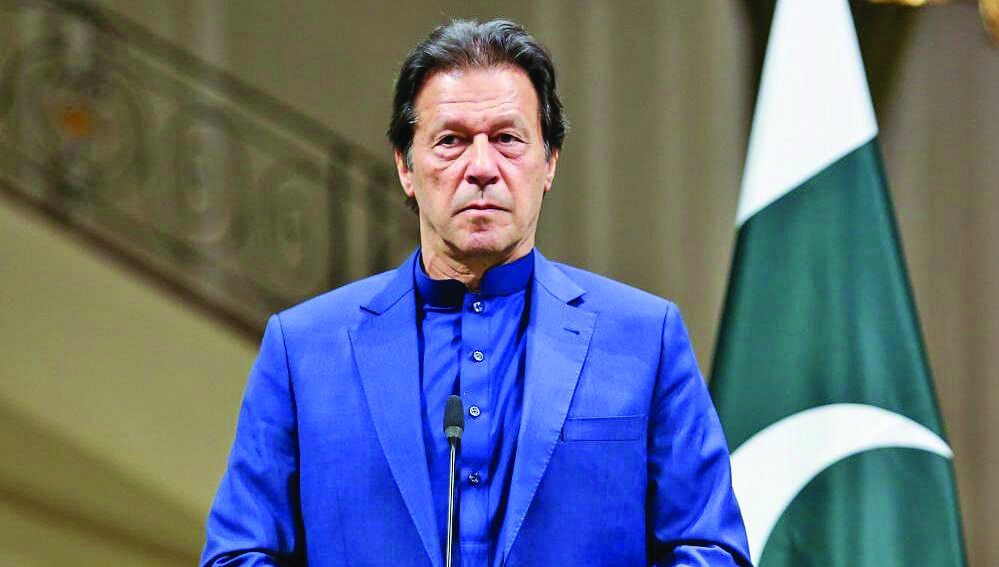Looming crisis in Afghanistan directly affecting Pakistan and Iran, PM Khan says

TEHRAN – Pakistan’s Prime Minister Imran Khan has criticized a continued freezing of Afghanistan's assets by the United States as the war-hit country is grappling with looming humanitarian crisis, warning that the deterioration of the situation will cause more problems for Pakistan and Iran as Afghanistan’s neighbors, IRNA reported on Thursday.
Addressing the Islamabad Conclave 2021 under the theme of "Peaceful and Prosperous South Asia" organized by the Institute of Strategic Studies Islamabad (ISSI), Khan described the situation in Afghanistan as worrying and called for global efforts to resolve the humanitarian crisis in the Central Asian country.
The prime minister said the looming humanitarian crisis in Afghanistan will force Afghans to flood into Iran and Pakistan.
Iran and Pakistan have been hosting millions of Afghans since the Soviet Union invaded the country in late 1979.
“We are trying our best to inform the world that in spite of their like or dislike for the Taliban, the primary concern should be the 40 million Afghans, and what they will have to undergo if the current situation persists,” IRNA quoted the premier as saying.
In addition to the looming humanitarian crisis, Afghan citizens have been targeted by the terrorist Daesh group. Brutal attacks in Kunduz to Kandahar as well as a raid against a military hospital in Kabul are examples.
Peace in the war-torn country, Prime Minister Khan emphasized, was important for Pakistan, especially in light of the country's geo-economics goal.
The comments by Pakistan’s leader comes as foreign ministers from the OIC states are scheduled to hold on a meeting in Islamabad on December 19 to assess developments in Afghanistan and examine the humanitarian crisis in the country.
The UN humanitarian chief has warned that Afghanistan's economic collapse "is happening before our eyes" and urged the international community to take action to stop "the freefall" before it leads to more deaths.
Martin Griffiths said in an interview with The Associated Press on Thursday that donor nations need to agree that in addition to emergency humanitarian aid they need to support basic services for the Afghan people including education, hospitals, electricity and paying civil servants — and they must inject liquidity into the economy which has seen the banking system ""pretty well shut down."
"We're seeing the economic collapse being exponential," he said. "It's getting more and more dire by the week."
Griffiths said the liquidity issue must be settled by the end of the year and money must be funneled to front-line service workers during the winter, adding that he had to revise his earlier view that Afghanistan could get through the winter on pure humanitarian assistance because of the worsening economic situation.
As one example, he said, 4 million children are out of school and 9 million more will be soon and the reason is simple — 70% of teachers haven't been paid since August. "And if we don't make that happen, all that discussion about the right of women and girls going to school becomes academic," he said.
"So, my message today is a wake-up call about the humanitarian consequences of an economic collapse and the need to take urgent action," Griffiths said.
The Taliban overran most of Afghanistan as U.S. and NATO forces were in the final stages of their chaotic withdrawal from the country after 20 years. Taliban forces entered Kabul on Aug. 15 without any resistance from the Afghan army or the country's president, Ashraf Ghani, who fled. The Taliban initially promised tolerance and inclusiveness toward women and ethnic minorities but their actions so far, including renewed restrictions on women and the appointment of an all-male government, have been met with dismay by the international community.
The Afghanistan central bank's $9 billion in reserves, most of which is held in the United States, were frozen and the International Monetary Fund blocked about $450 million because of a "lack of clarity" about a new government.
The Taliban leadership has banned all foreign currency transactions and urged the U.S. to ease sanctions and release Afghanistan's overseas assets in order for the government to be able to pay teachers, doctors and other public sector employees.
Griffiths said the UN is asking the U.S. and other donors for money, which he insisted will not go to the Taliban but through UN channels to get directly to the people who need it — teachers, doctors, electricity providers and other civil servants.
Griffiths said the consequences of Afghanistan's collapsing economy are becoming more apparent — reports of hospitals without electricity, severe malnutrition and three or four children in one hospital bed, and tens of thousands of unpaid doctors, teachers and civil servants struggling to survive.
He recalled that the United States always supported the provision of electricity in Afghanistan, but 80% of electricity sources are "now at the brink of stoppage, and without electricity you have automatic consequences."
